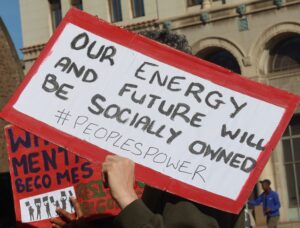
By Shir Hever
This text is based on the author’s contribution to the panel discussion held at the last International InkriT Conference in Berlin-Wannsee (18-21 May 2023) on the topic ‘New world dis/order’.*
No country in the world receives more military financing (Foreign Military Financing, or FMF) from the United States, or from any other country, than Israel. Egypt is in second place. Military financing to Israel started at 3 billion US dollars annually in 1973 and reached over 3.8 billion annually today.[i]
It is a common mistake to consider the U.S and Israel as “allies,” when in fact the relationship is much more one-sided. As professor Rashid Khalidi explained, the relationship between the U.S and Israel is hierarchical, and while Israeli soldiers are expected to risk their lives to protect U.S interests, the reverse is not true.[ii]
These are key facts for any debate on the role of Israel in the world. Reflecting on the latter demands, however, the ability to make a further, crucial distinction; namely, between an antisemitic slur – “Israel rules the U.S” – and a critical assessment of that relationship: “Israel is a regional proxy of U.S imperialism.”
But what does the US-Israel asymmetrical relationship consist of concretely? U.S military financing (usually called “military aid”) doesn’t actually contribute to the Israeli economy, because the Israeli government is obligated to use the money to buy from U.S arms manufacturers. The financing is in fact a subsidy to the U.S arms industry, which has a much stronger lobby in the U.S than the Israeli lobby, and a clear interest to keep the Middle East in a state of constant conflict.[iii]
In his book War Against the People, Jeff Halper points out how U.S global hegemony relies on regional powers to act as U.S proxies, and that Israel plays an important role in projecting U.S power in the Middle East, as well as in developing and selling arms which fuel various conflicts in the region and beyond.[iv] Recent regional developments, however, especially the rapprochement between the Islamic Republic of Iran and the kingdom of Saudi Arabia as well as the implosion of the Israeli economy and political system in the face of effective Palestinian resistance, have weakened Israel and therefore U.S imperial power in the Middle East.
Israeli governments understood their role in projecting U.S imperialism in the Middle East well. In the 1973 war, which consisted in a proxy conflict for the Cold War[v]; in 1991, when the U.S ordered Israeli forces not to intervene in the war against Iraq in order to maintain the cooperation of Arab allies[vi]; and, finally, in 2006, when Israeli forces invaded Lebanon, egged-on by U.S president George W. Bush who refused the request of the Israeli government to withdraw early when the fighting went sour for the latter’s forces.[vii]
In recent years, the UAE has become a major arms importer to compete with Israel and holds arms fairs of its own, challenging Tel-Aviv’s monopoly over such events in the region. Qatar has also become the largest U.S military base in the region.[viii] President Obama pursued a policy of reducing U.S reliance on Israeli violence, and improved relations with other Middle East governments, specifically Egypt, Qatar and Turkey.[ix] Although this policy has been mostly reversed by the Trump administration, the Abrahamic Accords through which Israel normalized diplomatic relations with the UAE, Bahrain and Morocco (and partially with Sudan and Oman) under the auspices of the Trump-led US government were covered by analysts as a diplomatic coup for Netanyahu’s right-wing government. Nevertheless, the long-term benefits of these accords go to the Arab countries which used Israel as a steppingstone to improve their standing with the West.[x]
Shortly after signing the accords, Netanyahu lost the elections and the short-lived “coalition for change” ascended to power in Israel. The main difference between the Bennet-Lapid government of 2021-2022 and the Netanyahu governments is in their foreign affairs approach. Netanyahu focused his efforts on populist right-wing regimes, such as the Bolsonaro government in Brazil, Modi in India and Orbán in Hungary. Netanyahu’s close friendship with Trump and with senior members of the U.S Republican party are part of his strategy of building an alliance of populist-right wing racist and authoritarian regimes, offering Israel’s expertise and experience in surveillance, incarceration and oppression to those regimes who need it the most, because they face fierce protest movements.[xi]
Lapid criticized Netanyahu for allowing Israel’s relations with Western liberal democracies to falter,[xii] but Netanyahu’s perspective is not to adapt policies simply to fit Israel’s strategic partners, but rather to choose the strategic partners which fit Israel’s existing policies. Netanyahu was caught on a live microphone calling the EU “crazy” for coupling the peace process with the Palestinians with its relationship with Israel.[xiii] Instead of appeasing France, Germany and the UK, Netanyahu made efforts to build up stronger relations with Hungary, India and the UAE. He built those relationships on two levels. On the public level, these relationships were built on shared values – Israeli apartheid was used to justify repression of minority rights in countries which ally with Israel, using security justifications next to ethnic and religious ones for undemocratic discriminatory policies. Behind the scenes, diplomatic relations have taken the form of military and security exchanges. In what Suraya Dadoo call’s “spyware diplomacy,” authoritarian regimes which hosted Netanyahu and showered him with honors have been rewarded with contracts to buy spyware surveillance technology.[xiv]
For Netanyahu, however, the true purpose of foreign relations has always been domestic: to assay the concerns of the Israeli public about the growing boycott movement against Israel, the BDS movement, and to prove his worth as prime minister.[xv] More than any other Israeli politician, Netanyahu has built up the potential threat which Israel faces from Iran, and repeated ad-nauseum that Iran is coming ever closer to obtaining a nuclear weapon. In this context, Israel’s strategy was presented as joining a coalition of conservative Sunni monarchies who are also threatened by Iran: Bahrain, Oman, UAE, to some extent Jordan, and above all Saudi Arabia. Although Israel, a state which treats Muslims as second-class citizens and frequently initiates humiliating provocations in the Al-Aqsa Mosque, is not an easy ally for Muslim governments to accept, the hype of Israeli military power and intelligence capabilities have opened the door for Israel’s integration into the anti-Iran alliance.[xvi]
On March 10th, Saudi Arabia and the Islamic Republic of Iran announced that they will open diplomatic relations and begin a process of normalization, brokered by China. China apparently started mediating between the two states shortly after the war in Ukraine broke out, taking advantage of U.S attention shifting to a focus on Russia.[xvii] Through this deal, China has become a major player in the Middle East, and the entire premise of the anti-Iran coalition headed by Saudi Arabia has collapsed. Regardless of the non-democratic and repressive nature of both the Iranian and Saudi regimes, the end of the conflict between them, which is about three centuries old and predates the Islamic Revolution, is excellent news for the whole Middle East, except for Israel. Peace talks have already advanced in Yemen. Even though Iranian involvement has been exaggerated, the Saudi Coalition can no longer claim that the Yemen war is a proxy war fought against Iran and have started negotiations to end the conflict.[xviii]
Three days after the Saudi and Iranian announcement, the UAE stated that it is suspending all arms deals with Israel. Considering that the Abrahamic Accords between Israel and the UAE were hailed as a “peace treaty” (between states which were never at war), but in fact were necessary to expand the scope of the arms exchange between the two states, the suspension of military relations is de facto a suspension of the Abrahamic Accords themselves.[xix]
Both the far-right Israeli government as well as the liberal-Zionist opposition bemoan the reproachment between Saudi Arabia and Iran, and consider it a catastrophe for Israeli interest. The Israeli intelligence agency, the Mossad, claims that it was aware of the year-long peace talks but this is likely an empty boast, as the agency did nothing to sabotage the talks. Taken together, the openly anti-peace stance of the Israeli government and its opposition expose how militaristic and imperialistic Israel’s role in the Middle East has become.[xx]
The war in Ukraine has been repeatedly reported in Western media as an unexpected heroic stand of the Ukrainian forces against the Russian army, so much so that the line between journalism and propaganda has become blurry. NATO has gone on a spending spree to fortify its armies because of the war, but on a diplomatic level, Russia was able to peel off some key NATO allies who have declared their neutrality (mainly from the Global South), while securing some allies for itself such as Iran. The war and especially the Chinese initiative have cracked the isolation of Iran and undermined Israel’s role as the regional bully. Through the weakening of Israel’s regional role, U.S hegemony on the Middle East has weakened as well.[xxi]
This comes at a time in which Israeli society and economy are imploding rapidly. The so-called judicial overhaul pushed forward by the far-right Israeli government is merely a symptom, not the cause, for the disintegration of the delicate status-quo which kept the Israeli democratic façade intact. Thousands of military officers announce their refusal to serve the far-right government,[xxii] many Israelis have lost faith in the future of the Israeli economy and are taking out their savings or preparing to leave the country.[xxiii] The protest movement in Israel against the far-right government uses the term “democracy” repeatedly, but the absurdity of calling an ethnocratic apartheid state “democratic” when the majority of the population under its control consists of Palestinians, with the Jewish population making up just 48% percent, is no longer containable by the Israeli public.[xxiv]
We are witnessing the rapid collapse of the State of Israel as a Jewish state, a development which is poised to change the dynamic of the entire Middle East. Without the threat of Israeli airstrikes, assassinations and invasions, democratic forces in the area will be able to act more freely than ever before.
Dr. Shir Hever is a member of the Jüdische Stimme für gerechten Frieden in Nahost e.V. [Jewish Voice for Just Peace in the Middle East], Managing Director of BIP, Bündnis für Gerechtigkeit zwischen Israelis und Palästinenser [Alliance for Justice between Israelis and Palestinians]. He was born and raised in Jerusalem and now lives in Heidelberg. His second book, The Privatization of Israeli Security, published in 2017 by Pluto Press, is an edited version of his PhD thesis in Political Science at the Free University of Berlin.
*The content of HKWM-Blog publications is the responsibility of its authors and of InkriT e.V. and does not necessarily reflect the position of the Rosa Luxemburg Foundation.
Notes
[i] Ruebner, Josh; Booker, Salih; Hassan, Zaha, 2021, “Bringing Assistance to Israel in Line with Rights and U.S. Laws,” Carnegie Endowment for International Peace, May 12th, 2021, https://carnegieendowment.org/2021/05/12/bringing-assistance-to-israel-in-line-with-rights-and-u.s.-laws-pub-84503.
[ii] Khalidi, Rashid, 2009, Sowing Crisis: The Cold War and American Dominance in the Middle East, Beacon Press.
[iii] Hever, Shir, 2015, “Israel, Iran and the US Arms Industry,” Middle East Eye, May 29th, 2015, https://www.middleeasteye.net/fr/node/44010.
[iv] Halper, Jeff, 2015, War Against the People: Israel, the Palestinians and Global Pacification, Pluto Press.
[v] Bar-Siman-Tov, Yaacov, 1984, “The Strategy of War by Proxy,” Cooperation and Conflict, Vol. 19, No. 4, pp. 264-273.
[vi] Arens, Moshe, 2018, “27 Years since the Gulf War – Why didn’t Israel respond?” The Jerusalem Post, February 12th, 2018, https://www.jpost.com/opinion/27-years-since-the-gulf-war-why-didnt-israel-respond-542437.
[vii] Rogers, Paul, 2006, “Lebanon: War Takes Root,” OpenDemocracy, August 2nd, 2006, https://www.opendemocracy.net/en/war_israel_3793jsp/.
[viii] Taylor, Adam, 2019, “As Trump Tries to End ‘endless wars,’ America’s Biggest Mideast Base is Getting Bigger,” The Washington Post, August 21st, 2019, https://www.washingtonpost.com/world/as-trump-tries-to-end-endless-wars-americas-biggest-mideast-base-is-getting-bigger/2019/08/20/47ac5854-bab4-11e9-8e83-4e6687e99814_story.html.
[ix] Elmenshawi, Mohamed, 2013, “The Predicament of the Obama Administration and the Muslim Brotherhood,” Middle East Institute, April 25th, 2013, https://www.mei.edu/publications/predicament-obama-administration-and-muslim-brotherhood.
[x] Steiner, Adam, 2021, “The Abrahamic Accords: a Not-So-Peaceful Peace Treaty,” The McGill International Review, January 15th, 2021, https://www.mironline.ca/the-abraham-accords-a-not-so-peaceful-peace-treaty/.
[xi] Kressel, Daniel, 2022, “Far-Right ‘Landlordism’ Wants to Dispossess Entire Populations,” Jacobin, November 13th, 2022, https://jacobin.com/2022/11/israel-brazil-bolsonaro-netanyahu-far-right-settler-colonialism.
[xii] Euractiv, 2021, “EU Eyes ‘Fresh Start’ with Israel after Netanyahu Ouster,” Euractiv, July 13th, 2021, https://www.euractiv.com/section/global-europe/news/eu-eyes-fresh-start-with-israel-after-netanyahu-ouster/.
[xiii] Middle East Eye, 2017, “Netanyahu Slams EU for ‘Absolutely Crazy’ Demands on Israel,” Middle East Eye, July 20th, 2017, https://www.middleeasteye.net/news/netanyahu-slams-eu-absolutely-crazy-demands-israel.
[xiv] Dadoo, Suraya, 2022, “Israel’s Spyware Diplomacy in Africa,” Orientxxi, September 12th, 2022, https://orientxxi.info/magazine/israel-s-spyware-diplomacy-in-africa,5859.
[xv] Akehurst, Luke, 2020, “Four Ways the Abraham Accords Dismantle the Anti-Israel Camp’s Narrative,” Jewish News, October 13th, 2020, https://blogs.timesofisrael.com/four-ways-the-abraham-accords-dismantle-the-anti-israel-camps-narrative/.
[xvi] Vakil, Sanam, 2023, “The Abraham Accords and Israel-UAE Normalization,” Chatham House, March 28th, 2023, https://www.chathamhouse.org/2023/03/abraham-accords-and-israel-uae-normalization/07-how-leverage-abraham-accords-challenges-and.
[xvii] Hafezi, Parisa; Abdallah, Nayera; Yaakoubi, Aziz, 2023, “Iran and Saudi Arabia Agree to Resume Ties in Talks Brokered by China,” Reuters, March 10th, 2023, https://www.reuters.com/world/middle-east/iran-saudi-arabia-agree-resume-ties-re-open-embassies-iranian-state-media-2023-03-10/.
[xviii] Al-Jazeera, 2023, “Progress in Yemen Peace Talks Hailed Despite Prisoner Swap Delay,” Al-Jazeera, April 11th, 2023, https://www.aljazeera.com/news/2023/4/11/progress-on-yemen-peace-talks-despite-prisoner-swap-delay.
[xix] Haaretz, 2023, “Report: UAE Halts Military Purchases from Israel Amid Political Turmoil,” Haaretz, March 12th, 2023.
[xx] Kingsley, Patrick, 2023, “Saudi Deal with Iran Surprises Israel and Jolts Netanyahu,” The New York Times, March 10th, 2023, https://www.nytimes.com/2023/03/10/world/middleeast/israel-saudi-iran.html.
[xxi] Gowan, Richard, 2023, “The Global South and the Ukraine War at the UN,” International Crisis Group, March 9th, 2023, https://www.crisisgroup.org/global-ukraine/global-south-and-ukraine-war-un.
[xxii] Brooks, Risa; Ben Sasson-Gordis, Avishay, 2023, “The Israeli Military’s Democratic Dilemma,” Foreign Affairs, May 9th, 2023, https://www.foreignaffairs.com/israel/israeli-military-democracy-benjamin-netanyahu.
[xxiii] Thornhill, John, 2023, “Israel Risks Turning into a Shut-Down Nation,” Financial Times, March 2nd, 2023, https://www.ft.com/content/953c45c8-835f-49e6-8fd0-6213afc46e7e.
[xxiv] Human Rights Watch, 2021, A Threshold Crossed: Israeli Authorities and the Crimes of Apartheid and Persecution. https://www.hrw.org/report/2021/04/27/threshold-crossed/israeli-authorities-and-crimes-apartheid-and-persecution.



